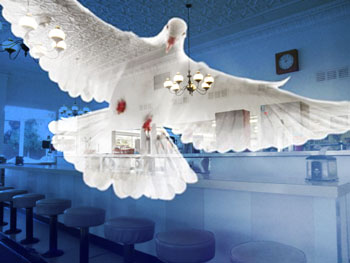
My stomach churned as I dressed to take Dad on our first lunch date in decades. For our outing today, he had groomed as carefully as a suitor. He’d taken his weekly shower, shaved, and put on a clean chambray shirt. His collar yawned around his neck, and the skin below his cuffs was papery as corn husks. Bracing his elbow so he wouldn’t stumble on the buckled sidewalk, I heaved open the thick glass door, and my father stuttered into Superior Dairy on his wooden cane.
The place wasn’t really preserved as a 1950s-style diner — they simply had never remodeled. The booths and bar stools were still the same pink vinyl I remembered, now faded to a dusty mauve and patched with strips of silver duct tape. Bypassing the counter, we slid into a window booth facing the park and read menus printed on paper placemats.
Without Mom, we had eaten most meals in the kitchen, with the clink of silverware on china echoing between us. Today Dad ordered a tuna sandwich, untoasted — they charged a dime to toast the bread — and a chocolate-chip milkshake. I had the same. As we waited for our food, I thought about another ice cream date at Superior Dairy, forty years earlier.
I’d ridden shotgun in Dad’s Chevy pickup, my feet dangling above the floorboard and my red plastic purse filled with Cheerios. Peering over the dusty dash, I could see the sky bleached by the shattering sun to a worn-out blue. On the parched sidewalk, my father circled his ropy arm around my shoulders as I bounced toward the glass doors of the diner. The counter loomed impossibly high, but Dad scooped his big hands under my armpits and boosted me onto the padded seat of a barstool.
After he ordered me a dish of vanilla ice cream, I asked a question that had been troubling me: Why was only one dove left on our telephone wire, when a pair had perched there all summer?
Mourning doves mate for life, he told me between sips of coffee. August was hunting season, and her partner had likely been killed by a sportsman down in the slough. He waited while I absorbed the terrible news and leaned closer into his chest: His work shirt was velvety from laundering, and I inhaled his smell of damp soil and laundry soap.
“Looks like you’ve got yourself a daddy’s girl,” the waitress said, winking at my father as she refilled his coffee mug.
My reverie was interrupted by the plump server who delivered our food. Dad took a big bite of bread and chewed noisily. As he wiped mayonnaise from the corners of his mouth, his eyes focused into the distance.
“I miss Mother,” he said to me.
After her death, my father had taken their engagement picture out of the cedar chest and pinned it to the front of his refrigerator with a magnet so he could see it as he drank his morning coffee. In the black-and-white photograph, Dad is grinning like an improbable sweepstakes winner, his arm snug around my mother’s waist. Her head is ducked slightly against the sun, and she’s pressed against him, leaning into her future.
“Why did God take my wife away from me?”
My sandwich lodged like a boulder in my throat. Dad was asking me for reassurance. I turned out the pockets of my memory, but couldn’t find a nickel of comfort.
“I don’t know,” I mumbled.
In the three months since she had died, I’d scrambled to fill Mom’s shoes. Vowing to keep my dad on the family farm, I’d spent my weekend visits loading his dirty laundry into the washing machine, driving him to the doctor for his insomnia and baking creamy rice puddings, his favorite Swedish dessert. Evenings, I slumped into my mother’s plush recliner in the living room and fell asleep with my paperback on my lap.
Feeling hollow with loss, his and mine, I glanced at the empty stools where we had sat four decades earlier. I remembered Dad’s patience as I sorted out the grim reality about the doves. His answer hadn’t softened my heartbreak, but his strong arms and earthy smell made it bearable.
Since Dad had been widowed, I hadn’t planned an outing that called for a fresh shirt. I’d filled our time together tending his physical needs. Now I realized that I could never take my mother’s place or explain away my father’s loss.
“I miss her too, Dad.”
I covered his gnarled hands with my warm ones, and the deep ladder of tension between his brows softened as our fingers intertwined. He squeezed my hand and smiled. Over ice cream, I exhaled and became my old self. Daddy’s girl.

